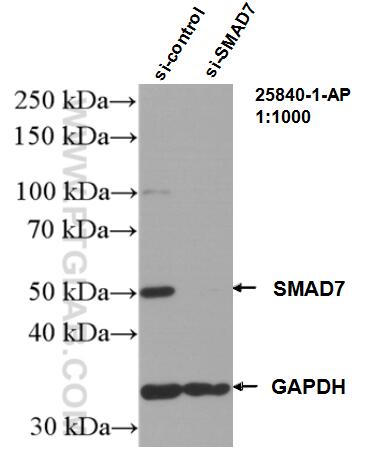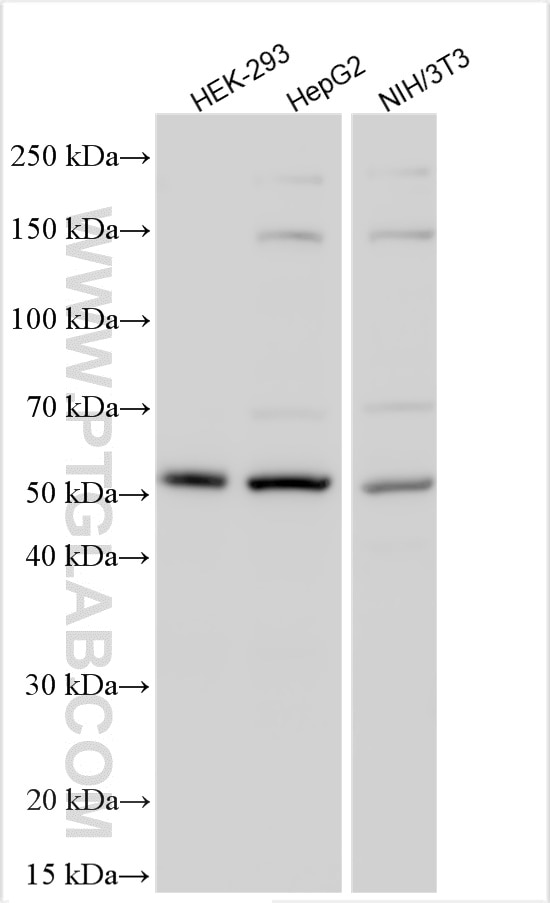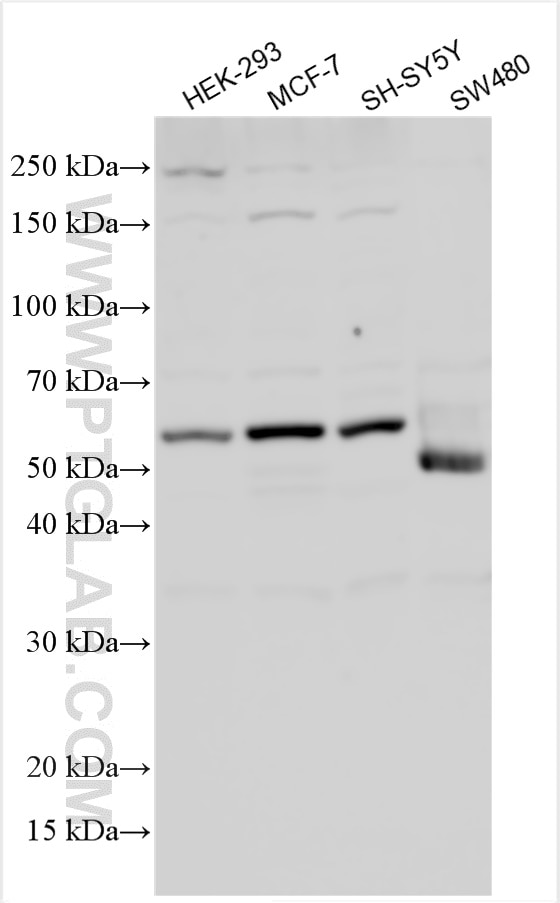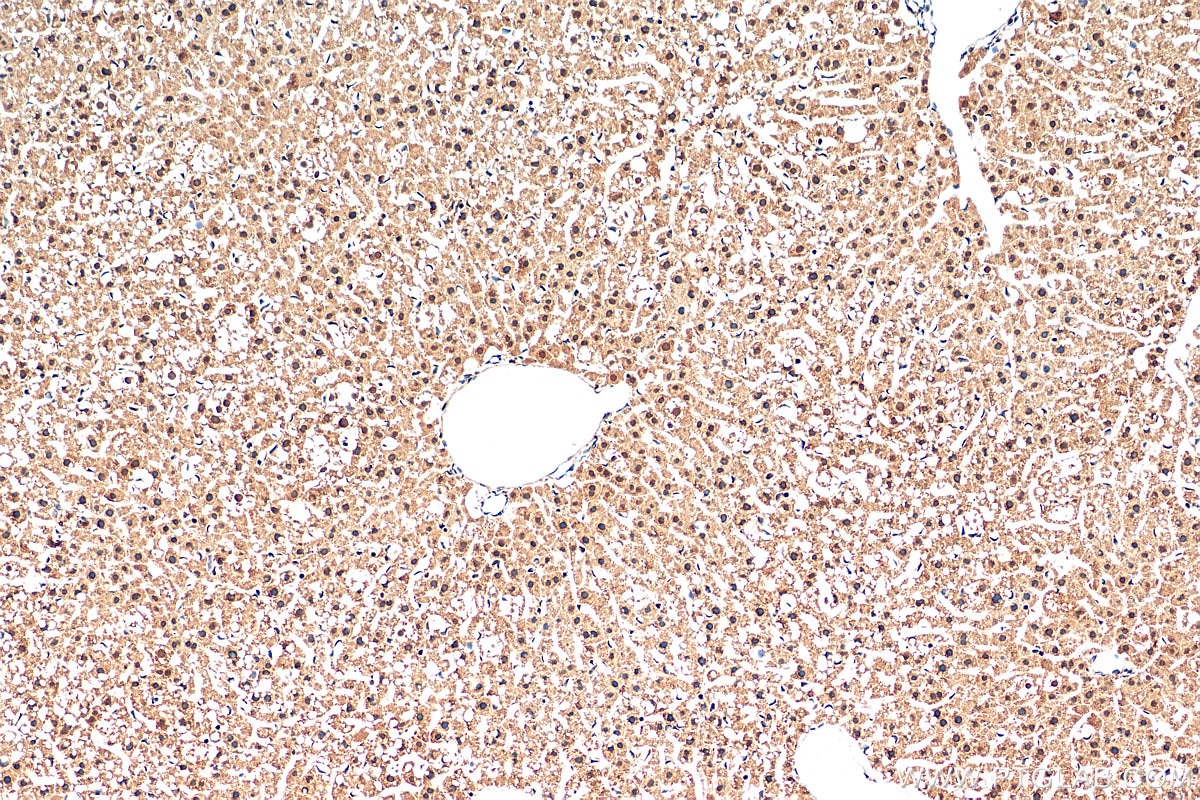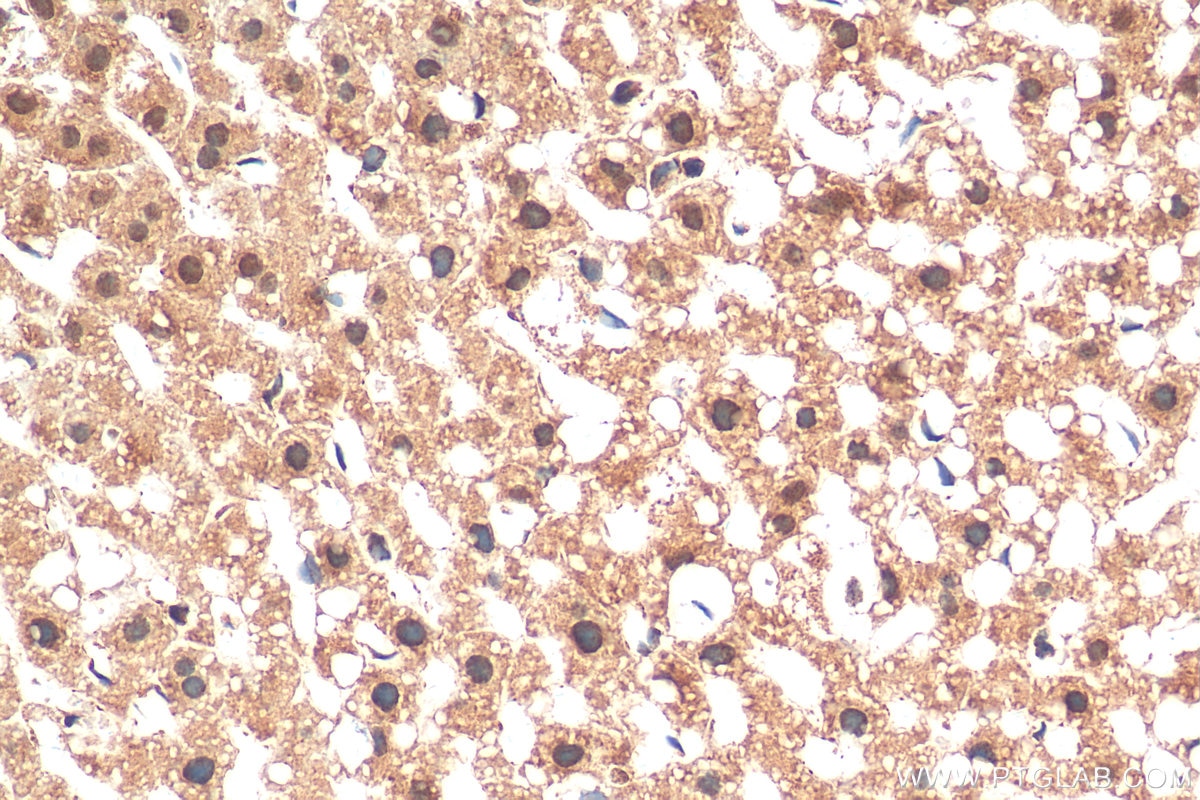Tested Applications
| Positive WB detected in | HEK-293 cells, HepG2 cells, NIH/3T3 cells, MCF-7cells, SH-SY5Y cells, SW480 cells |
| Positive IHC detected in | mouse liver tissue Note: suggested antigen retrieval with TE buffer pH 9.0; (*) Alternatively, antigen retrieval may be performed with citrate buffer pH 6.0 |
Recommended dilution
| Application | Dilution |
|---|---|
| Western Blot (WB) | WB : 1:500-1:3000 |
| Immunohistochemistry (IHC) | IHC : 1:50-1:500 |
| It is recommended that this reagent should be titrated in each testing system to obtain optimal results. | |
| Sample-dependent, Check data in validation data gallery. | |
Published Applications
| KD/KO | See 6 publications below |
| WB | See 105 publications below |
| IHC | See 9 publications below |
| IF | See 9 publications below |
| IP | See 2 publications below |
| CoIP | See 2 publications below |
Product Information
25840-1-AP targets SMAD7 in WB, IHC, IF, IP, CoIP, ELISA applications and shows reactivity with human, mouse samples.
| Tested Reactivity | human, mouse |
| Cited Reactivity | human, mouse, rat, pig, 人类 |
| Host / Isotype | Rabbit / IgG |
| Class | Polyclonal |
| Type | Antibody |
| Immunogen |
CatNo: Ag13688 Product name: Recombinant human SMAD7 protein Source: e coli.-derived, PET28a Tag: 6*His Domain: 1-426 aa of BC074819 Sequence: MFRTKRSALVRRLWRSRAPGGEDEEEGAGGGGGGGELRGEGATDSRAHGAGGGGPGRAGCCLGKAVRGAKGHHHPHPPAAGAGAAGGAEADLKALTHSVLKKLKERQLELLLQAVESRGGTRTACLLLPGRLDCRLGPGAPAGAQPAQPPSSYSLPLLLCKVFRWPDLRHSSEVKRLCCCESYGKINPELVCCNPHHLSRLCELESPPPPYSRYPMDFLKPTADCPDAVPSSAETGGTNYLAPGGLSDSQLLLEPGDRSHWCVVAYWEEKTRVGRLYCVQEPSLDIFYDLPQGNGFCLGQLNSDNKSQLVQKVRSKIGCGIQLTREVDGVWVYNRSSYPIFIKSATLDNPDSRTLLVHKVFPGFSIKAFDYEKAYSLQRPNDHEFMQQPWTGFTVQISFVKGWGQCYTRQFISSCPCWLEVIFNSR Predict reactive species |
| Full Name | SMAD family member 7 |
| Calculated Molecular Weight | 426 aa, 46 kDa |
| Observed Molecular Weight | 45-55 kDa |
| GenBank Accession Number | BC074819 |
| Gene Symbol | SMAD7 |
| Gene ID (NCBI) | 4092 |
| RRID | AB_2848137 |
| Conjugate | Unconjugated |
| Form | Liquid |
| Purification Method | Antigen affinity purification |
| UNIPROT ID | O15105 |
| Storage Buffer | PBS with 0.02% sodium azide and 50% glycerol, pH 7.3. |
| Storage Conditions | Store at -20°C. Stable for one year after shipment. Aliquoting is unnecessary for -20oC storage. 20ul sizes contain 0.1% BSA. |
Background Information
SMAD7, also named as Mothers against decapentaplegic homolog 7, is a 426 amino acid protein, which belongs to the dwarfin/SMAD family. SMAD7 Interaction with NEDD4L or RNF111 induces translocation from the nucleus to the cytoplasm (PubMed:16601693). TGF-beta stimulates its translocation from the nucleus to the cytoplasm. PDPK1 inhibits its translocation from the nucleus to the cytoplasm in response to TGF-beta (PubMed:17327236). SMAD7 as antagonist of signaling by TGF-beta type 1 receptor superfamily members has been shown to inhibit TGF-beta and activin signaling by associating with their receptors thus preventing SMAD2 access. SMAD7 functions as an adapter to recruit SMURF2 to the TGF-beta receptor complex and also acts by recruiting the PPP1R15A-PP1 complex to TGFBR1, which promotes its dephosphorylation. SMAD7 positively regulates PDPK1 kinase activity by stimulating its dissociation from the 14-3-3 protein YWHAQ which acts as a negative regulator.
Protocols
| Product Specific Protocols | |
|---|---|
| IHC protocol for SMAD7 antibody 25840-1-AP | Download protocol |
| WB protocol for SMAD7 antibody 25840-1-AP | Download protocol |
| Standard Protocols | |
|---|---|
| Click here to view our Standard Protocols |
Publications
| Species | Application | Title |
|---|---|---|
Brain Behav Immun MicroRNA-181c promotes Th17 cell differentiation and mediates experimental autoimmune encephalomyelitis. | ||
Nat Commun K235 acetylation couples with PSPC1 to regulate the m6A demethylation activity of ALKBH5 and tumorigenesis | ||
Cell Death Differ REGγ ablation impedes dedifferentiation of anaplastic thyroid carcinoma and accentuates radio-therapeutic response by regulating the Smad7-TGF-β pathway. | ||
Hypertension Novel Role for the Immunoproteasome Subunit PSMB10 in Angiotensin II-Induced Atrial Fibrillation in Mice. | ||
Theranostics Local administration of liposomal-based Srpx2 gene therapy reverses pulmonary fibrosis by blockading fibroblast-to-myofibroblast transition. |

